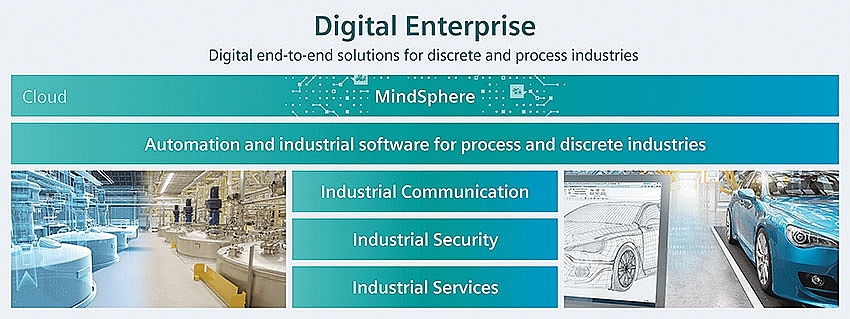Siemens unlocks digitalisation future
 |
| Siemens Electronic Factory in Amberg is a prime example of advanced product automation and has received numerous awards |
Digitalisation is transforming all areas of our life as well as existing business models. Manufacturing industries can largely benefit from taking advantage of technology trends such as generative design and intelligent models. Production becomes more innovative through additive manufacturing, advanced robotics, Artificial Intelligence (AI), and new service models are being developed with the use of cloud solutions and knowledge automation.
 |
| Dr. Pham Thai Lai |
In order to enable companies to fully make use of the digitalisation potential, Siemens is offering the Digital Enterprise – a holistic portfolio of software and automation solutions. The portfolio enables industrial companies of all sizes to implement current and future technologies for automation and digitalisation. Thus, they can tap into the full potential of Industry 4.0 and get ready for the next level of their digital transformation journey.
The Siemens Digital Enterprise holistic approach comprises of offerings for product design, production planning, plant design, production engineering, automation, commissioning, and services. Suppliers and logistics can also be integrated based on a consistent collaboration platform. Companies can start with digitalisation at any step of their value chain, for greenfield and brownfield plants, and based on standardised and open interfaces.
The Siemens Electronics Works (EWA) digital factory in the German city of Amberg is a prime example. Whether it is optimised throughput, ambitious cycle times, or reliable security measures, the future of manufacturing is already a reality in many areas of the EWA thanks to numerous solutions from the Digital Enterprise portfolio.
The EWA was founded in 1989 and manufactures products that include Simatic programmable logic controllers. Every year, the factory manufactures around 17 million Simatic products, meaning that one product is dispatched every second. Over 1,000 product variants are manufactured there, and are used to control plants and machinery as well as automate production facilities, saving time and costs, and improving product quality.
Production processes at Amberg itself are also controlled by about 2,800 Simatic components. Production functions on a largely automated basis, with 75 per cent of the value chain handled independently by machines and robots. In any 24-hour period, products are prepared for dispatch to approximately 60,000 customers worldwide. EWA manufactures to a quality standard of 99.999 per cent and, as the result of sustainable work quality and comprehensive data integration, this achievement sets a new benchmark for industrial production.
At EWA, hardware and software solutions, industrial communication, cybersecurity, and services are optimally co-ordinated. Groundbreaking technologies such as AI, industrial edge computing, and a cloud solution are already enabling highly flexible and extremely efficient and reliable production sequences. This makes EWA a strong example of a Siemens Digital Enterprise that will continue to consistently lead the way towards future digital transformation.
The most significant impact of digitising the factory floor at Amberg is that productivity has risen by 1,400 per cent, and this success story can be replicated elsewhere around the globe, including in Vietnam.
 |
| Digital Enterprise – a holistic portfolio of software and automation solutions |
Elsewhere, as Vietnam’s first volume car manufacturer, VinFast has successfully produced its first cars ahead of schedule using Siemens’ portfolio of integrated software and hardware. The entire value chain has been integrated and digitalised with Siemens’ Digital Enterprise portfolio.
In particular, VinFast has selected a suite of tools from Siemens product lifecycle management (PLM) software to help realise their plans for next-generation automotive and transportation design. Siemens provided a digitalisation solution across the entire automotive original equipment manufacturer value chain, which enabled VinFast to meet the company’s goals of creating the first Vietnamese-made automobile brand, as well as to promote the development of the industrial and manufacturing sector in the country.
VinFast benefits from the advantage of a connected digital twin across both design and manufacturing. They use an integrated digital platform including the Teamcenter portfolio for digital lifecycle management; an accompanying solution for product costing to support cost and value engineering; and industry-leading digital manufacturing software known as Tecnomatix, combined with SIMATIC IT UA for discrete manufacturing covering the Manufacturing Execution System layer.
Teamcenter connects the digital twin with a consistent digital thread, which helped VinFast increase speed and flexibility in development, optimise manufacturing processes, and use the insights gained from product and plant operations to improve future performance.
Vinsmart is another company member of Vingroup, which was founded in June last year with the mission to become a technology company on a global scale. Siemens has been supporting Vinsmart in realising this mission by providing a range of software from its Digital Enterprise portfolio that includes PLM Teamcenter, Polarion Application Lifecycle Management, NX CAD, and Mentor Xpedition.
Meanwhile, Truong Hai Auto Corporation (THACO) – a well-established auto manufacture, assembly, and distribution enterprise in Vietnam – has been a valued Siemens customer for many years. THACO, with 14,900 employees and distribution system of 89 showrooms and 53 dealers nationwide, has deployed Siemens PLM Teamcenter, Siemens integrated computer-aided design, manufacturing and engineering analysis (CAD/CAM) solution, Simcenter 1D and 3D, and the Siemens LMS Test to build up the corporation’s R&D Centre.
THACO is determined to push up partnership with Siemens in digitalising its entire factory located at Chu Lai Industrial Park, and in developing an Industry 4.0 standardised training system for its Tertiary Education College in this region.
At Siemens, we are well aware that each company has specific needs and requirements that need to be acknowledged individually. Therefore, our Digital Enterprise portfolio is specifically tailored to suit the individual needs of the various industries. We can help to maximise the journey toward digitalisation and Industry 4.0 by unlocking the full potential of digitalisation for all.
What the stars mean:
★ Poor ★ ★ Promising ★★★ Good ★★★★ Very good ★★★★★ Exceptional
Related Contents
Latest News
More News
- Masan Consumer names new deputy CEO to drive foods and beverages growth (February 23, 2026 | 20:52)
- Myriad risks ahead, but ones Vietnam can confront (February 20, 2026 | 15:02)
- Vietnam making the leap into AI and semiconductors (February 20, 2026 | 09:37)
- Funding must be activated for semiconductor success (February 20, 2026 | 09:20)
- Resilience as new benchmark for smarter infrastructure (February 19, 2026 | 20:35)
- A golden time to shine within ASEAN (February 19, 2026 | 20:22)
- Vietnam’s pivotal year for advancing sustainability (February 19, 2026 | 08:44)
- Strengthening the core role of industry and trade (February 19, 2026 | 08:35)
- Future orientations for healthcare improvements (February 19, 2026 | 08:29)
- Infrastructure orientations suitable for a new chapter (February 19, 2026 | 08:15)

 Tag:
Tag:



















 Mobile Version
Mobile Version